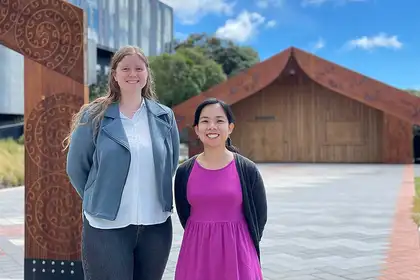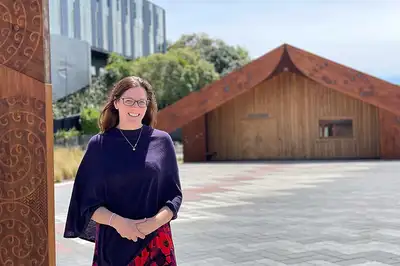
Dr Lauren Vinnell and Dr Marion Tan have been awarded funding from the Earthquake Commission, along with Associate Professor Julia Becker, from the Joint Centre for Disaster Research.
Three Massey University researchers have been awarded a total of nearly $200,000 from the Earthquake Commission (EQC), to help New Zealanders better understand our natural hazard risk and identify ways to reduce the impact of those hazards.
Successful applications for this year’s grants were those that aligned with EQC’s research priorities, but also weaved in either a mātauranga Māori, climate change or social science lens over their research.
The programme saw a record number of applicants this year, with around 120 researchers applying for the grant. Thirteen research projects were successful, including those of Associate Professor Julia Becker, Dr Marion Tan and Dr Lauren Vinnell from the Joint Centre for Disaster Research (JCDR).
We asked them to share some information about why their research is important and how it will be carried out.
Associate Professor Julia Becker - Long-term communication of volcanic risk for effective decision-making
Communication of volcanic risk varies over time, depending on the status of the volcano and the population at risk. It is made challenging by factors such as uncertainty about the likelihood and timing of an eruption, and the potential impacts which may vary across space and time. Communication about such aspects are essential to inform decision-making.
Dr Becker’s research will investigate methods of risk communication from previous Tongariro National Park events to draw out effective aspects of risk communication over timeframes of quiescence, unrest, eruption, and post-eruption.
“We will also draw on communication lessons from recent earthquakes to identify if these are transferable to a volcano context. Results will help science, monitoring and response agencies frame and provide advice for decision-making. We will be working on this research with a team at GNS Science, alongside agencies and groups responsible for volcanic risk management in Tongariro National Park,” Dr Becker says.
The project team also includes Dr Emma Hudson-Doyle from JCDR and Dr Danielle Charlton, Dr Sally Potter and Dr Graham Leonard from GNS Science.
Dr Becker is a Senior Lecturer and Doctoral Supervisor at JCDR. She undertakes social science research on a range of natural hazards and environmental issues. Her areas of expertise include perceptions, preparedness, community resilience, emergency management and warnings. She has worked extensively in New Zealand and internationally.

Associate Professor Julia Becker.
Dr Marion Tan - Improving school-based hazards education outreach programmes: towards enhancing alignment with schools and communities
There are many outreach programmes for schools teaching pupils about hazards and preparedness, Dr Tan says.
“These initiatives come and go, their outputs may be well received in the short-term, and their impacts may create a lasting impression on schools and communities. But with a limited outlook towards sustainability and continuity, resources can be wasted in initiating, reinitiating, and duplicating similar school outreach programmes.”
Through this project, Dr Tan and her team will design sustainable outreach programmes that will have a continuous and long-term resilience outlook for the schools and their surrounding communities.
“We will work with schools and kura in the Bay of Plenty. We will use a participatory design methodology where we will design the outreach programmes with the schools,” she says.
The project team also involves Professor David Johnston and Kelvin Tapuke from JCDR, Professor Anna Brown and Andrew Tobin from Toi Āria: Design for Public Good, and Brandy Alger from QuakeCoRE.
Dr Tan is a post-doctoral fellow at JCDR. She completed her PhD in Emergency Management at Massey in 2020, where she conducted her doctoral research on the usability of disaster apps. She has expertise in the use of technology for disaster management with current research interests in user engagement, citizen science, and outreach and education.
Dr Lauren Vinnell - Changing societal expectations and risk appetite: exploring influences on building earthquake resilience in lower seismic hazard zones
While some areas are at higher seismic risk than others, all of Aotearoa New Zealand can and does experience earthquakes.
“Previous research tells us that people tend to perceive lower risk as low risk; in this case, people might think about their risk in comparison to other parts of the motu which can lead to a false sense of safety and therefore low levels of preparedness,” Dr Vinnell says.
In this research, a collaboration with the University of Auckland and the University of Otago, Dr Vinnell’s team will use surveys and focus groups to understand how people in Tāmaki Makaurau and Te Tai Tokerau think about and act on earthquake risk.
“We can then use this understanding to inform how we encourage communities in these and similar areas to prepare for hazards such as earthquakes.”
The project team also includes Professor David Johnston, Associate Professor Julia Becker, Dr Emma Hudson-Doyle, and Kelvin Tapuke from JCDR, Professor Jan Lindsay from University of Auckland and Associate Professor Caroline Orchiston from University of Otago.
Dr Vinnell is a post-doctoral fellow at JCDR. She completed her PhD degree in Social Psychology, and is interested in understanding peoples' judgments and behaviour around preparation for and response to natural hazards. She has experience in experimental survey design and quantitative analysis. Dr Vinnell is currently examining predictors of household preparedness, response to multi-hazard risk communication, impacts of earthquake drill participation, and human behaviour during earthquake shaking.